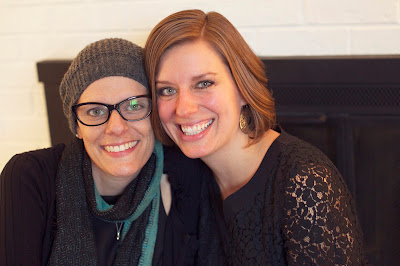What to do when you don’t know what to do

Best-selling author Kara Tippets' story was not a story of disease, although she lost her battle with terminal cancer. It was not a story of saying goodbye, although she was intentional in her time with her husband and four children. Kara's story was one of seeing God in the hard and in the good. It was one of finding grace in the everyday. And it was one of knowing "God with us" through fierce and beautiful friendship.
In Just Show Up (David C Cook), Kara and her close friend, Jill Lynn Buteyn, write about what friendship looks like in the midst of changing life seasons, loads of laundry, and even cancer. Whether you are eager to be present to someone going through a difficult time or simply want inspiration for pursuing friends in a new way, this eloquent and practical book explores the gift of silence, the art of receiving, and what it means to just show up.
What to do when you don’t know what to do
By Jill Lynn Buteyn
Everyone knows someone with cancer. Or
depression. Or a debilitating illness. Often we’re not sure what to do or say
around people who are sick or suffering. When my friend Kara Tippetts was diagnosed
with breast cancer in her mid-thirties, we hadn’t known each other for very
long. I didn’t have a clue what to do or how to help her. But I decided I did
want to be there for her, even if cancer left me feeling clueless.
I learned a lot from watching Kara’s
community rally around her while she fought cancer, and around her family after
she passed. If you’re in the place I was – that confusing moment of “how do I
do this?” – here are a few guidelines for what to do when you don’t know what
to do.
1.
Choose
them. It sounds so simple, but this is the first step we can take in being
there for a friend or even acquaintance who’s fighting breast cancer—move
toward them. When things are hard or uncomfortable, or maybe we don’t know
someone that well, stepping toward them can be scary and leave us feeling
vulnerable. But you don’t have to know what you’re doing right away. Just
deciding to be there for them is the biggest hurdle to cross. Don’t run away
out of fear of doing or saying the wrong thing. Make the decision that you’re
in, even if you don’t know exactly what that looks like.
2.
Keep it simple. We often complicate things. We think our
gestures need to be grand or cross continents, but that isn’t the case.
Sometimes it’s the cup of coffee, the hug, the text that says, “I’m thinking of
you,” that makes all the difference. Yes, some people will rock at organizing
the big fundraiser (and if that’s you, go for it!), but small, simple things
also matter to the heart.
3.
Be
specific. When you want to help your friend or loved one, be specific in what
you offer to do. If you don’t know where to start, think about your gifts. What
brings you joy and might also bless your friend during their hardship? Often
that tug, that idea already fighting for attention in your mind is exactly
where to begin. Instead of saying, “let me know what you need,” say “I’d like
to help by doing ______. Does Tuesday work for you?” This makes it easier for a friend to accept help, and when you
serve within your gifting, everyone benefits.
4.
Be a good
listener. When our people are telling us about their hardship, it’s hard not to
want to help… and fix. But most of the time, they aren’t asking for this input.
Often they just need someone who’s willing to listen and let them vent about
what’s going on. Try to listen without
letting your mind spin regarding what you want to say next about fixing their
suffering.
5.
Keep
including them. Many times when we know our friend is sick or hurting, we
assume that they don’t have the time or energy to be with friends or attend an
event. This might be true—maybe they can’t fathom doing one more thing—but we
can still give them the choice. Keep inviting them and don’t leave them out. At
the same time, we need to be gracious if they need to say no. This is about
showing them they are still loved, appreciated and noticed.
I’d love to tell you I did
all of these things right as a friend surrounding Kara, but I didn’t. I made
plenty of mistakes. In fact, sometimes that’s how I learned—by doing it wrong
first. Hopefully these tools will give you the confidence to lean toward a
friend instead of away, and to enter in to the blessing of doing community
together.
~~~~~~~~~~~~~~~~~~~~
Jill Lynn Buteyn is
the co-author of Just Show Up: the Dance of Walking Through Suffering Together, written with
the late Kara Tippetts. Buteyn is also the author of Falling for Texas, an
inspirational novel, and a recipient of the ACFW Genesis Award for her fiction
work. Buteyn lives near the beautiful Rocky Mountains with her husband and two
children.
Learn
more about Jill Lynn Buteyne and Just
Show Up at www.jill-lynn.com and on Facebook (JillLynnAuthor), Pinterest (JillLynnAuthor), Instagram (JillLynnAuthor) and Twitter (@JillLynnAuthor).

Comments